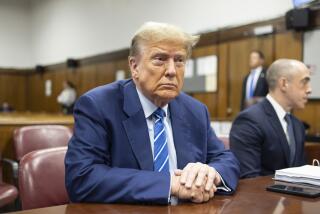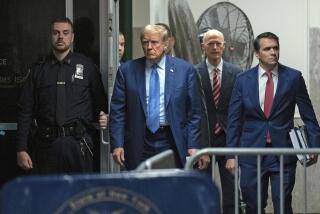Op-Ed: Trump’s severe lack of credibility doomed his travel ban with the courts

Another federal appeals court has refused to lift a hold on President Trump’s travel ban. (June 13, 2017)
- Share via
In March, U.S. District Judge Derrick Watson, in Hawaii, suspended key portions of President Trump’s revised executive order temporarily halting all refugee admissions and immigration from six Muslim-majority countries. A three-judge panel for the U.S. Court of Appeals for the 9th Circuit has now unanimously upheld the crucial portions of Watson’s preliminary injunction. Like the 4th Circuit’s ruling last month in a similar challenge to the “travel ban,” the 9th Circuit’s decision marks a major defeat for the administration and shows the courts’ unwillingness to take Trump’s national security claims at face value.
What’s notable is that both appeals courts chose paths that enabled them to look beyond the text of the order. Legally, these opinions look different, but in terms of the result, one is really just the photo negative of the other: The 4th Circuit determined that bad reasons motivated Trump’s travel ban order; the 9th Circuit decided he didn’t have good ones.
The 4th Circuit, in a 10-3 ruling of the entire court, squarely addressed the contentious constitutional claim at the heart of the case: Was Trump’s order intended to discriminate against Muslims in violation of the 1st Amendment? The court looked at outside evidence, including campaign statements, to determine that the order was indeed discriminatory.
The 9th Circuit panel stayed away from the constitutional claim and more modestly concluded that Trump exceeded his authority under the relevant federal immigration statute — but this, too, involved looking at more than the words of the order: The panel concluded that Trump had not offered findings sufficient to support the conclusion that the interests of the United States hinge on banning 180 million people from entry based on only their national origin.
Deferring to the president would mean taking his word on a policy that experts across the political spectrum have already agreed is a farce.
Because the courts usually give the executive branch a lot of leeway in immigration and national security cases, if the Supreme Court agrees to review Trump’s travel ban, the critical question will be whether the 4th and 9th circuits were right in looking at or requiring evidence outside the order itself. The dissenting judges in the 4th Circuit case argued, for example, that the majority should have stuck to the order’s “plain, unambiguous, and religiously neutral text.”
That dissent made some fair legal points. But it also missed an important aspect of what appears to be driving these decisions: an awareness of how blind deferral to Trump’s order could easily damage the public’s trust in the judicial process itself.
You might think that legally it shouldn’t matter what the public thinks about the courts. But public trust is the invisible foundation of the judiciary’s power. As Supreme Court Justice Felix Frankfurter observed in 1962, the courts have “neither the purse” of the legislative branch “nor the sword” of the executive branch; their “authority . . . ultimately rests on sustained public confidence in [their] moral sanction.”
Unsurprisingly, then, the courts so far have been reluctant to lend their moral sanction to an exclusionary order that Trump passed not long after, as a candidate, he had called for “a total and complete shutdown of Muslims entering the United States.” The courts are also reluctant to sanction an order that first seared the American consciousness as a policy of stunning cruelty, accompanied with images of refugees handcuffed at U.S. airports and stories of families torn apart. And as the 9th Circuit made clear Monday, the courts are reluctant to sanction a policy that lacks legitimate national security justification.
In the uproar over the ban, the president has offered strangely little to support it. Meanwhile, the public has been informed that no deadly terrorist attacks in the U.S. since 9/11 have been attributed to foreign nationals from any of the target countries. As both the 4th and 9th circuits emphasized, a Department of Homeland Security report concluded that citizenship in any particular nation is an “unreliable” threat indicator. And in March, 134 former national security and other senior government officials wrote a letter to the president condemning the ban as “damaging to the strategic and national security interests of the United States.”
All of this put the courts in a terrible bind. The courts generally don’t, and don’t want to, second-guess a president’s expertise in national security matters. But here deferring to the president would mean taking his word on a policy that experts across the political spectrum have already agreed is a farce. Against such a backdrop, one way for judges to protect the judiciary’s legitimacy is to rely on a legal standard that allows them to consider not just what the executive order says but also outside variables that affect how it is perceived. That’s exactly what the 4th and 9th circuits did.
The political scientist Richard Neustadt famously proclaimed that “presidential power is the power to persuade.” But by flouting ethical and political norms, Trump has cultivated the opposite power — the power to repel. Trump’s difficulty in filling key executive branch positions or in finding a law firm willing to represent him in connection to the Russia investigation has been cited as a testament to the widespread desire to avoid contact with the administration and what it professes to stand for. But the severe resistance the courts are exhibiting when it comes to the president’s policies suggests that Trump’s lack of credibility has reverberations beyond the executive. The courts, too, fear Trump’s taint.
Jane Chong is the deputy managing editor of the website Lawfare. Joseph Pomianowski is a recent graduate of Yale Law School and is researching comparative constitutional law at the Polish Academy of Sciences.
Follow the Opinion section on Twitter @latimesopinionand Facebook
More to Read
A cure for the common opinion
Get thought-provoking perspectives with our weekly newsletter.
You may occasionally receive promotional content from the Los Angeles Times.










